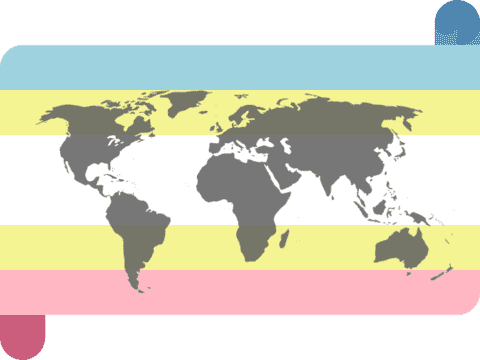
Pedophilia has been a contentious subject lately, as the topic has been increasingly used to attack political and ideological opponents. However, due to its controversial and poorly understood nature, accuracy is rarely prioritized in resulting conversations. Consequently, most people misuse relevant terminology in ways that range from slightly inaccurate to completely nonsensical. This leads to confusion, which detracts from the conversation and impedes meaningful discussion.
Pedophilia and minor attractions
Pedophilia is a pattern of stable and persistent attractions to prepubescent children. It is one of four minor attractions - the others being nepiophilia (attraction to infants), hebephilia (attraction to pubescent teens), and ephebophilia (attraction to post-pubescent minors). Contrary to popular belief, minor attractions function identically to peer attractions.
It should be noted that the misconceptions and inaccuracies discussed in this article apply to all minor attractions, not just pedophilia. Additionally, keep in mind that pedophilia is only one of these attractions and not an umbrella term for all of them. Though we refer to pedophilia specifically because it is better known, the title of this article could have substituted it with any other minor attraction or the term "minor attractions" itself. Somebody who experiences one or more minor attractions (including pedophilia) is known as a minor-attracted person (MAP).
Why wording matters
With any controversial topic, shared language is the foundation of meaningful conversation. Pedophilia and minor attractions are no exception. Many of the terms that are often used in discussions on these subjects were coined by researchers, and they are still widely used by experts in the mental health and child protection fields. Ensuring these words are used accurately throughout our society allows the research conducted by these experts to be read and understood by a larger audience.
These terms are also widely used by MAPs and individuals who have interacted with them. Due to societal stigma, it is already difficult for MAPs to discuss their experiences and correct misconceptions about them and their attractions. Unclear and misleading terminology adds to the problem, giving people an even poorer understanding of minor attractions and those who experience them.
Common Mistakes
Most inaccuracies in discussions about pedophilia fall into a few specific categories. Identifying and understanding these common blunders can help you avoid them and correct others when they slip up.
Misconceptions
By far the most prominent misuse of terminology related to pedophilia is the use of "pedophile" as a synonym for "child abuser." The former refers to somebody who experiences an attraction, while the latter refers to someone who has sexually abused a child. Using them interchangeably conflates attractions with abuse, which can be offensive to sexual abuse survivors and is unfairly stigmatizing to MAPs. Additionally, since the majority of child abusers are not MAPs and the majority of MAPs never sexually abuse a child, the assumption that the groups have a significant overlap is inaccurate. In the past, child protection and mental health experts have spoken out about how the prevalence of this misperception in journalism may put more children at risk of sexual abuse.
Because minor attractions are so poorly understood, some people make assumptions about what causes MAPs to be attracted to minors. As a result, you may see claims that MAPs are "attracted to vulnerability" or "innocence". While there are MAPs who are attracted to these qualities, just as some peer-attracted individuals may be attracted to similar qualities in their peers, these statements do not reflect the diversity of attractions among minor-attracted people. In fact, one study found that innocence and "lack of inhibition" were considered the least attractive childlike psychological traits by MAPs. |
| MAPs' attractiveness ratings of childlike traits |
Others may claim that pedophiles "resort to children" as a result of being unable to find willing sexual partners within their own age bracket. This is often used as an insult against MAPs, attempting to suggest that they are in some way undesirable as a partner. This claim is disproven by the fact that some MAPs have long-term romantic and sexual relationships with adult partners. Additionally, considering that the most common age for a MAP to discover their attractions is 14 years old, minor attractions would likely be significantly more prevalent if they were caused by a lack of sexual partners, as the vast majority of 14-year-olds are not sexually active.
There is also a somewhat widespread belief that pedophilic attractions represent a "desire to rape" or otherwise sexually abuse children. While it is true that an adult engaging in sexual activity with a child would constitute statutory rape in the real world, the same may not be true in a MAP's fantasies. Many MAPs desire consensual sexual interactions with children and understand that this is not possible in the real world, resorting instead to fantasy scenarios where imaginary children can consent to sex. A few MAPs are aroused by the idea of non-consensual sex, but the same is true for nearly any group, and one study found that 62% of women experience rape fantasies.
Inaccurate terms
In discussions surrounding pedophilia, it is not uncommon to see people refer to it as a disorder. There is some justification for this, as pedophilia was once widely considered a mental disorder by experts. However, as of 2019, both the International Classification of Diseases and the Diagnostic and Statistical Manual of Mental Disorders have been updated to reflect the consensus among experts that attraction patterns cannot be considered mental disorders. The diagnosis of pedophilic disorder still exists in both texts, however, it now refers to distress experienced or harmful actions taken as a result of pedophilia.
Some people refer to pedophilia as a fetish, often believing that the term is somehow derogatory or has a negative connotation. According to Oxford Languages, a fetish is "a form of sexual desire in which gratification is strongly linked to a particular object or activity or a part of the body." As children are not objects, activities, or body parts, an attraction to them would not be considered a fetish. Pedophilia and other minor attractions instead fall into the category of chronophilias, which are attractions to individuals in a particular stage of development.
Pedophilia and other minor attractions are often mistakenly described as being characterized by urges or obsessions. Although there are MAPs who experience urges or obsessions, they are a small minority, just as a small number of people with any other type of attractions experience sexual urges or obsessions. Even when urges or obsessions are present, they rarely impact a MAP's behavior, and researchers have found no difference between MAPs and non-MAPs in terms of capacity for self-control. In many cases, urges or obsessions may be the result of internalized stigma, which can drive a MAP to attempt to suppress their attractions, causing them to become overwhelming. Reducing the societal stigma surrounding minor attractions would reduce the extent to which these MAPs experience urges and obsessions.
Nonsensical language
Both the terms "convicted pedophile" and "illegal attractions" have become popular recently, the former in the media and the latter among the public. Neither of these terms has a useful meaning, as there is no country in which attractions alone are illegal (such a law would be impossible to enforce, as the government cannot read minds). Additionally, pedophilia is not a crime because it consists of thoughts, and thoughtcrimes do not exist. Of course, engaging in sexual activity with a child is illegal in most countries, but this does not make minor attractions illegal.
Those who pretend to be voices of reason in debates surrounding pedophilia and minor attractions often advocate for pedophiles to get support in order to "recover" from their attractions. This is another nonsensical phrase, as pedophilia is not a disorder from which anyone requires recovery, and there is little evidence that minor attractions can be changed. Conversion therapy is widely understood to be both ineffective and harmful, and any mental health professional who attempts to engage in such practices would be in violation of their ethical duties.
Some people describe child sexual abuse (CSA) survivors as "victims of pedophilia," often in an effort to use their experience as an excuse to stigmatize MAPs. As an attraction, pedophilia consists of thoughts, which have no power to inflict harm. Child sexual abuse is undoubtedly harmful, but it is an action, and there is no inherent connection between CSA and pedophilia or any other minor attraction. Calling a CSA survivor a "victim of pedophilia" is as illogical as calling a man who was raped by another man a "victim of homosexuality." Attractions do not abuse people, and using language that implies otherwise spreads misinformation about the causes of abuse and impedes the work of sexual violence prevention experts.
Accurate terminology
Now that you know what to avoid, you may be wondering how to correctly talk about pedophilia and minor attractions. While there's no simple answer to this, one of the best ways to learn is to listen to MAPs. Our MAP Stories page has a collection of stories about the lived experiences of MAPs, many of which are written by MAPs, using language that accurately reflects these experiences. Our Allies page contains advice on getting involved in the MAP community, so check it out if you'd like to learn more about and interact directly with MAPs.
If you're just looking for a quick guide to get you started, we recommend checking out our Dictionary, which contains definitions of MAP-related terms based on how they are used by MAPs and experts. You can also visit our Research page if you want to learn about the latest findings on MAPs and minor attractions while avoiding the biases that arise from the widespread stigma surrounding these topics.





Subscribe